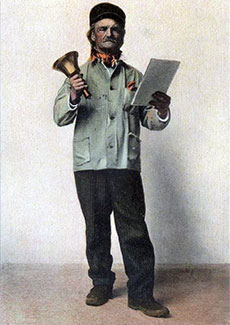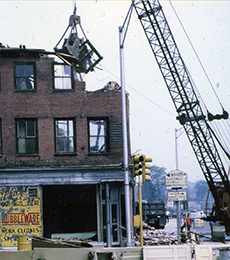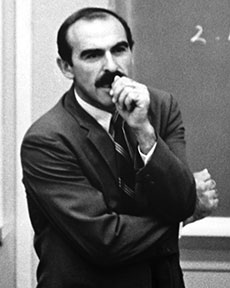A Series Examining the Evolution of Local News
Theorists offer many reasons—most more complicated, and lost in pseudo-intellectual rhetoric, than they need to be—about why local news is threatened. Yes, the Internet robbed newspapers of classified and retail advertising revenues and changed the habits of those who consume news. But, it is much more than that.
Part 1 of a 5-part series
This series examines the evolving and lasting role of local news reporting, effects of WHAV’s unique entrepreneurial approach in shaping a competitive market, intersection of cutting edge and traditional technologies, importance of looking back in order to move forward and a bold vision of the future that offers advantages for residents now.
By Tim Coco
President and General Manager

Local news distribution began with town criers in the American colonies.
The news media has been called the “fourth estate” because it is supposed to keep the other three honest.
Historically the first three were the clergy, nobility and commoners, but the fourth estate today is charged with keeping in check the machinations of political leaders by informing voters—who ought to hold the most power—so that they may act accordingly. The concept was so important to our founding fathers they enshrined it in the U.S. Constitution’s first amendment which, among other things, prohibits Congress from “abridging the freedom of speech, or of the press.”
Absent news reporting, public officials might be emboldened to enrich themselves at the people’s expense (well, greatly more than people think they are already doing); harm society in myriad ways, from toxic environmental placements to pocketbook issues to criminal activity; and suppress opposition. Whether on worldwide, national or local levels, the people have a right to know so they may take action. They also want to know who’s building what next door, how much their taxes are going up and why, what their children are learning in school, whether their neighbor sells drugs, what to do during their free moments and more.
During earlier times, people received all of their information from local news sources. The town crier shouted out the news with bell in hand. Then, newspapers came on the scene in the American colonies. The first, Publick Occurrences in 1690, was short-lived thanks to its banning by British authorities. Just a few years later though, Boston News-Letter began publishing in 1704. The rise of national news sources emerged in the 20th century with national newspapers, broadcasting networks and even movie newsreels. Luckily, there were still local newspapers and radio stations to keep communities informed of backyard happenings. The original WHAV, which went on the air in 1947, was one of those.
What Really Wounded Local Media

Haverhill’s urban renewal program played a role in the decline of local news. (Photograph courtesy of David J. Connolly.)
Theorists offer many reasons—most more complicated, and lost in pseudo-intellectual rhetoric, than they need to be—about why local news is threatened. Yes, the Internet robbed newspapers of classified and retail advertising revenues and changed the habits of those who consume news. But, it is much more than that.
Starting during the late 1950s, Interstate highways took people away from local shopping districts, sales taxes drove people over state lines if they were in border communities like Haverhill, urban renewal programs demolished mortgage-free mercantile buildings, unregulated private equity “rolled up” mom and pop stores leading to big box stores and government deregulation permitted consolidation of local broadcast stations into ever-larger chains.
Those interstate highways, combined with relaxed local zoning rules, brought strip malls filled with those big box stores; resulting property speculation drove up real estate prices and edged out local businesses; and global trade deals destroyed high paying manufacturing jobs, taking out the local consumer who fueled the local stores that kept the newspaper and radio station afloat with advertising. These lower-paid workers were forced to the big box stores where they could buy cheap foreign-made goods—a vicious cycle.
“But after adjusting for inflation, today’s average hourly wage has just about the same purchasing power as it did in 1979, following a long slide in the 1980s and early 1990s and bumpy, inconsistent growth since then. In fact, in real terms the average wage peaked more than 40 years ago: The $4.03-an-hour rate recorded in January, 1973, has the same purchasing power as $22.41 would today,” according to a Pew Research Center study conducted in 2014.
Households now rely on a minimum of two incomes and busy schedules not only keep parents from properly looking after their children, but also rob civic groups and charities of volunteers. Local business owners shouldn’t be blamed for “cashing out” when property values rose or industry consolidation took place as their incomes were being squeezed too.
Yes, you can pretty much blame the politicians for all of the above. Ironically, it was the local media’s job to tell you, but it too was badly weakened.
A Problem of Definition

Theodore Levitt, Harvard Business Review.
In 1960, founder of modern marketing Theodore Levitt explained why railroads were dying—a lesson apparently lost on newspaper publishers.
“The railroads did not stop growing because the need for passenger and freight transportation declined. That grew. The railroads are in trouble today not because that need was filled by others (cars, trucks, airplanes, and even telephones) but because it was not filled by the railroads themselves. They let others take customers away from them because they assumed themselves to be in the railroad business rather than in the transportation business,” he wrote in his article, “Marketing Myopia,” which appeared in the Harvard Business Review.
Newspapers defined their business as putting ink on dead trees and not as providing news to the public. Like people swapping rail seats for driver’s seats, readers did not stop devouring news, they turned to other sources. As Leavitt said of the railroads, “they were product oriented instead of customer oriented.” Even CommonWealth magazine, which proudly touts its commitment to journalism, seems to trust more those with ink-stained hands than those who publish with pixels if its daily email is any example.
Like the railroads, traditional news sources didn’t redefine themselves, they consolidated. More newspapers and radio stations were consolidated into fewer debt-ridden companies. As revenues declined, reporters, pages and time were cut—that is, the very product consumers wanted to buy was cut.
Why WHAV’s Model is Different and Worth Supporting
WHAV could simply define itself as a non-profit. This is an important differentiator because there are no pesky investors with whom to share a percentage (or please with coverage), but that’s not enough. Even though others seem to think their business structures are somehow key, consumers understandably prefer news over spreadsheets.
Instead, as early as 2004 when the new WHAV began operations, there was little emphasis on “radio.” While WHAV aired on a low-power AM radio station, it also streamed and published stories on the Internet and delivered audio (and weekly video) to cable television stations. Even though WHAV is planning to add a new FM radio station to ensure everyone in the community benefits, it still defines itself as a local news organization first.
During the rest of this series, readers will learn how WHAV competes with an entrepreneurial mindset, why technology not simply a cost-cutting tool, where the past leads in the present and what a bold new vision means for residents.
Help WHAV “Make Waves” and Bring Local News to FM
 Tom Bergeron, honorary chairperson of WHAV’s “Make Waves” campaign, is asking for your help in raising at least $100,000 to put Haverhill’s own FM radio station on the air. A rare window of opportunity has opened that could put WHAV on FM sooner than anticipated, but it is dependent on your generosity. Please support the only Haverhill-based news source that’s always free with your donation by clicking here.
Tom Bergeron, honorary chairperson of WHAV’s “Make Waves” campaign, is asking for your help in raising at least $100,000 to put Haverhill’s own FM radio station on the air. A rare window of opportunity has opened that could put WHAV on FM sooner than anticipated, but it is dependent on your generosity. Please support the only Haverhill-based news source that’s always free with your donation by clicking here.
Tomorrow: Positive Effects of News Competition with a Caveat


Well said. The media has been compromised for years and never thought THEY could be held accountable. We know different now as people gravitate away from main stream media sources and to alternative venues that provide accuracy without a noticed bias.
Tim, great article! I’m looking forward to reading the rest of the series.
The internet allows for newspapers the ability to instantaneously report news. It also has created a community where literally everyone can comment on it via comment forums like this one. These forums provide an important and valuable tool for those seeking the truth that isn’t always reported, especially when it comes to the actions of government officials. Comment sections have become a significant annoyance for lying, corrupt officials who want to manipulate news sites to report on only the information and stories of ‘their’ choosing.
Look no further than the actions of the Eagle Tribune who caved to the pressures of the mayor’s of Haverhill and Methuen to do away with their anonymous comment section. These corrupt, secretive officials worked hard and succeeded in denying folks of their First Amendment rights. And look no further than the outrageous actions by the Haverhill City Council who approved the taking of private property via eminent domain in order to sell it for a profit to a private developer as collusion by the Eagle Tribune, as they didn’t even report on it…whereas WHAV did. What the ET got in return for selling their soles is tough to say, because they continue to creep toward going out of business.
Tim, thank you for providing an open and unedited comment forum.
“it was the local media’s job to tell you” –
The media today is relegated to state sponsored political propaganda that has become extremely successful by lying by omission or outright purposeful deceit.
“in real terms the average wage peaked more than 40 years ago” –
Which is exactly when Ronald Reagan and Tip O’Neil struck the true grand bargain in regard to spending and debt. That era marked the beginning of deficit spending, an era that has led us to where we are today. They claimed at the time they would pay it back, but none did, Clinton came close then Bush/CONgress went “full retard” and Obama/CONgress had to match the stupidity.
“you can pretty much blame the politicians for all of the above” –
Or…Blame The People who keep electing those that do them, their families, and their fellow American harm. Politicians amusingly believe when they are re-elected that they must be doing a great job when it is nothing further from the truth. Party loyalty, confirmation bias, cognitive dissonance, uninformed voters (what’s left of them), and simply a lack of good people wanting to run for office keep the cronies in power.
“global trade deals destroyed high paying manufacturing jobs” –
As the comment above pointed out, NAFTA was the beginning of the end, and since, crony capitalist have paid politicians well to pass Bills they neither read or write for the benefit of the few. The irony is, those that were decimated by such legislation, like the now near extinct private unions, continue to support the politicians that passed it – see Senator (then Representative) Edward Markey. Or even better, as the late Steve Jobs stated to Obama: “Those jobs are never coming back.” He’s right, Americans love their iPhones made by cheap/slave labor.
“public officials might be emboldened to enrich themselves at the people’s expense” –
Might? I like you sense of humor Tim.
“Households now rely on a minimum of two incomes” –
Incomes that have been in decline for 15 years, Massachusetts of course is ahead of the national trend with a 10% reduction (52% increase in taxation). Also, don’t look at the lack of home ownership, another trend Massachusetts is leading the national trend. The poor and lower middle classes are finished here, as pricing far exceeds income levels, which of course now has led to Neo-Feudalistic rent pricing. Then again, one just needs to look at the players that benefit, and those that made it legal to get where we are today.
Nice write-up Tim. Unfortunately the media, sans you for now, isn’t interested in truth, only ad revenues and political favor. Politicians don’t want anything to do with transparency or accountability as the status quo keeps them in power, just the way they legislated it – see gerrymandering (both sides do it). A free people are the enemy to this corrupted paradigm which these politicians support, and once again as the comment suggests, as the “race to the bottom” continues, the poorer and less free The People will become at the expense of the crony few.
A lot of the problems in the economy are government issues, by that I mean they have made the business climate unfriendly to heavy industry by regulating it to death literally. Among others the railroads which have been bludgeoned under Amtrak’s uses of rights of way for passenger Vs. freight traffic.Amtrak makes more with passenger service but only if you can get people from point a to point b safely and on time. with less trade and goods to transport the railroads are certainly hurting.
This area was rife with heavy industry ,take a look around, what are we making here in the USA any more? What is being made in the local region of Haverhill as compared to twenty five years ago, the answer? Not very much , we make people unemployed that is what we are doing .Again rules are a good thing but if the rules keep getting changed even as the old rules are being implemented then its no wonder that businesses are going off shore with manufacturing. It is just too easy for large corporations boards of directors to just pull the plug. With bad trade deals like NAFTA and now with the TPP being shoveled through our inept executive branch of government. It has become a circus train that’s departing for far off lands.
You brought up newspapers, all well and good, an honorable and time honored method of delivering news. outdated and outpaced by todays modern society we are our own worst enemy. By making digital media more accessible to all the newspaper business is struggling to survive, I live in Brunswick Georgia at present ,and even I am getting the Boston Globe online.
I am in the process of writing a book on the rise and fall of the paper industry in the New England region. And newsprint is one of the media that has been hard hit . Many paper mills in Maine are closing or seriously cutting back on production because of lack of need for the product. The mill in our own city shutdown ,Did anybody rise up and do anything to stop it or try and save it? No, 174 people lost good paying jobs and have found work with lesser benefits if any and less dollars in their pockets.
That was 174 people that will no longer contribute as much as they once did, to local businesses and the local economy in general. When a mill such as the paperboard plant closes everyone loses. Stop and think about how many different jobs that one mill provided for .And I am not talking about the mill itself but all of the area businesses that made a living out of that mill. And the paper mill, that’s just one example.
We are on a race to the bottom.If we as consumers and business owners do not smarten up we will all not have very far to go for Chinese food because they will own America one business at a time And with number 6 you get egg roll!